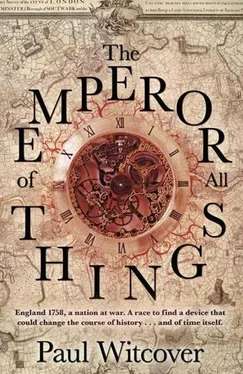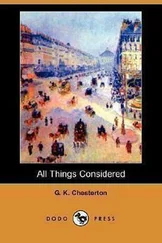Longinus said nothing. He gestured Quare into the chamber, then followed him inside. He closed the door, tugged the pull, and the stair-master began to descend.
Quare counted the seconds to himself. When he reached twenty-two, the stair-master slowed; at twenty-eight it stopped. The door slid open, revealing what appeared to be, at least as far as Quare could judge in the weak light, a fissure carved out of solid rock, scarce wide enough for two men to stand side by side. He could not see very far before a curtain of darkness descended, but he felt a whisper of cold, damp air that suggested the fissure extended a good distance ahead.
‘What is this place?’ he whispered, as if standing on the hushed threshold of a cathedral.
‘You shall see,’ Longinus answered in a whisper of his own. He gestured for Quare to step out and then followed him out of the chamber, lifting two candles from their sconces. One of these he passed to Quare.
As the door closed behind them, Longinus led Quare into the depths of the fissure, which narrowed as they advanced, until they were walking single file. The path zigged and zagged, following a gentle but steady decline. The chill in the air grew more pronounced, and Quare smelled a damp mineral tang. The words walls , floor and ceiling were too suggestive of civilization to describe what surrounded him; this passage, he realized, had not been carved or even extended by the hand of man but instead had been cut into the bedrock of the earth by Nature herself in some ancient paroxysm of violence that had sundered stone from stone. The rock was slick with moisture, and there was a sound of dripping, eerily magnified, that wove in and out of the sounds of their own footsteps and breathing: a sound very much like the ticking of the clocks in the rooms above, as if Longinus’s temporal shield extended even below the surface.
‘How deep are we?’ he asked, still whispering.
‘A quarter of a mile,’ said Longinus.
‘Does this passage lead to the guild hall?’
‘Not this passage, no,’ Longinus said. ‘We must go deeper for that.’
‘Deeper? How far does this fissure descend?’
‘Why, we have barely scratched the surface,’ Longinus said, sounding amused. ‘Did you not know that the netherworld of London is honeycombed with such spaces as this? Here one might see Nature’s rough draft of Magnus’s internet.’
As he spoke, the fissure widened. Longinus used his candle to light a torch that lay, along with a supply of others, against the rock face to their right. The flame sprang up, and the darkness fell back, revealing a vast chamber whose full extent was impossible to judge. Quare lit a torch of his own and raised it, gazing about in awe. ‘Incredible – we might almost be standing beneath the dome of St Paul’s!’
‘There are larger caverns by far to be met with below the ground. Indeed, I have often thought that another city exists here, a kind of anti-London … or, since these spaces long pre-date the first rude building raised above them, it is London that is the obverse reflection of this place.’
‘A city below a city … Do people live here, then?’
‘Some,’ said Longinus. ‘It was through one of the branching tunnels of this London underground, if I may term it such, that Guy Fawkes and his fellow conspirators gained access to the cellars of Parliament. Others have found their way here for more benign purposes, compelled by curiosity or misfortune. I learned of the tunnels from my father, and he from his, and part of my inheritance was a collection of maps, to which I have added substantially over the years, for, as you can imagine, a working knowledge of this maze might well benefit anyone desirous of moving about the city in secrecy. Yet I do not believe I have discovered more than a fraction of what exists. There are routes I have not explored, passages too dangerous to traverse unaided, if at all. Many who come here, for whatever reason, do not find their way out again – I have come upon their bodies, or what is left of them, often enough in my explorations. Others do not wish to leave, and dwell here like the kobolds of legend, furtive and sly, inured to the dark and suspicious of surface dwellers; I have done much over the years to gain their trust, for they do not take kindly to intruders. But tonight we shall not stray from the familiar paths – familiar to me, at least. They will take us back to the guild hall, with no one the wiser.’
‘How can you be certain the Old Wolf doesn’t know of these paths? Perhaps there will be guards waiting to take us as we emerge.’
‘There is always a risk,’ Longinus said with a shrug. ‘But I think it unlikely. I have shared my knowledge of the underground with no one – not even Master Magnus himself. Do not forget that I have spent many hours in the guild hall, disguised as a servant. If the Old Wolf or anyone else there knew of these spaces, I would have discovered it before now. No, their knowledge of the underground extends no further than the dungeon in which you were imprisoned. They have no notion of what lies below those cells. No doubt they did once, long ago, for some of the old entrances have been bricked up … though even those barriers are crumbling now, and useless.’
‘And when we gain entrance to the guild hall – what then?’
‘That will depend on what we find there. Planning can only take one so far, Mr Quare; we regulators live or die by improvisation. But let us “suit the action to the word, the word to the action”, as the Bard has it. Come.’ He advanced into the cavern, leaving Quare to follow.
This he did, albeit slowly, gazing about with a mix of trepidation and wonder. The ceiling was so high overhead that he could not see it, only long fingers of rock that depended out of the dark like icicles … melting icicles, for they dripped with water whose mineral content – the rich tang of iron and limestone freighted the cold air – had accreted into slick stone fingers on the cavern floor that reached up to clasp what had given them birth, a many-handed infant grasping for its many-handed mother, as if this were the pits of Tartarus into which Zeus had cast the Titans. Or as if these two sundered halves strove to pull themselves back together, repairing the ancient breach that had separated them. Despite the spaciousness of the cavern, Quare was very aware of the weight pressing down, all the streets and buildings of the London he knew resting on the shoulders of this secret sister city, which seemed at once as solid as a fortress and as fragile as a bubble.
‘No dawdling, Mr Quare,’ came Longinus’s impatient voice.
Quare hurried to catch up.
His guide stood waiting at the far side of the cavern, beside a fissure angling sharply into the rock – one of many such passages converging here, Quare thought, like streets and alleys leading to a central square in the world above.
‘It is impressive, I know,’ Longinus said. ‘Like something out of Dante. Later, when we are not so pressed for time, I will take you on a tour. But for now you must not let yourself be distracted. Follow as closely as you can, as lightly as you can, and speak only as necessary, for sound travels in peculiar ways in these convoluted spaces.’
Quare nodded. His mouth was dry, his skin covered in clammy sweat beneath the loose grey costume of Grimalkin. Once again, he tried to discern some connection to the hunter, straining not just with his ears but with every fibre of his being to hear the timepiece calling to him as Tiamat had said it would. To feel its tug. But all he felt was a diffuse tingling, as if his garments were imbued with a faint electrostatic charge.
This sensation he associated, after a moment’s reflection, not with the hunter but with the various timepieces secreted about his person, whose ticking constituted a steady background noise that merged into the echoes of dripping water until – as he had often felt in the guild hall – it was easy to fancy himself within the workings of a gigantic clock. Only this was a clock far older and greater than any built by human hands.
Читать дальше












